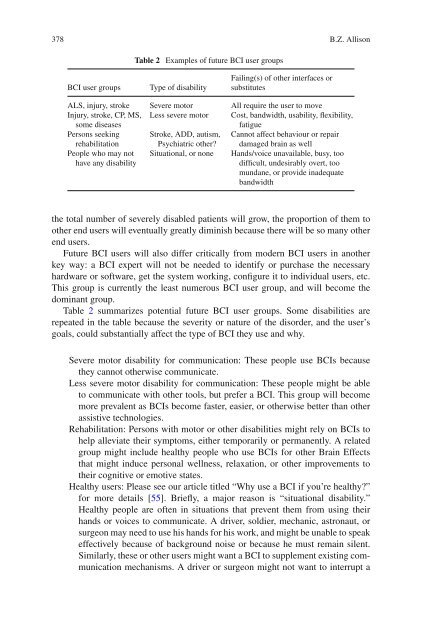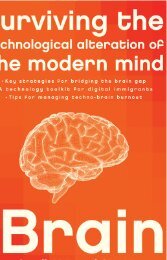- Page 2 and 3:
THE FRONTIERS COLLECTION
- Page 4 and 5:
Bernhard Graimann · Brendan Alliso
- Page 6 and 7:
Preface It’s an exciting time to
- Page 8 and 9:
Contents Brain-Computer Interfaces:
- Page 10 and 11:
Contributors Brendan Allison Instit
- Page 12 and 13:
Contributors xi Femke Nijboer Insti
- Page 14 and 15:
List of Abbreviations ADHD Attentio
- Page 16 and 17:
Brain-Computer Interfaces: A Gentle
- Page 18 and 19:
Brain-Computer Interfaces: A Gentle
- Page 20 and 21:
Brain-Computer Interfaces: A Gentle
- Page 22 and 23:
Brain-Computer Interfaces: A Gentle
- Page 24 and 25:
Brain-Computer Interfaces: A Gentle
- Page 26 and 27:
Brain-Computer Interfaces: A Gentle
- Page 28 and 29:
Brain-Computer Interfaces: A Gentle
- Page 30 and 31:
Brain-Computer Interfaces: A Gentle
- Page 32 and 33:
Brain-Computer Interfaces: A Gentle
- Page 34 and 35:
Brain-Computer Interfaces: A Gentle
- Page 36 and 37:
Brain-Computer Interfaces: A Gentle
- Page 38 and 39:
Brain-Computer Interfaces: A Gentle
- Page 40 and 41:
Brain-Computer Interfaces: A Gentle
- Page 42 and 43:
Brain-Computer Interfaces: A Gentle
- Page 44 and 45:
30 J.R. Wolpaw and C.B. Boulay by b
- Page 46 and 47:
32 J.R. Wolpaw and C.B. Boulay 2 Br
- Page 48 and 49:
34 J.R. Wolpaw and C.B. Boulay Fig.
- Page 50 and 51:
36 J.R. Wolpaw and C.B. Boulay Sens
- Page 52 and 53:
38 J.R. Wolpaw and C.B. Boulay pote
- Page 54 and 55:
40 J.R. Wolpaw and C.B. Boulay EEG-
- Page 56 and 57:
42 J.R. Wolpaw and C.B. Boulay 29.
- Page 58 and 59:
44 J.R. Wolpaw and C.B. Boulay 72.
- Page 60 and 61:
46 J.R. Wolpaw and C.B. Boulay 117.
- Page 62 and 63:
48 G. Pfurtscheller and C. Neuper F
- Page 64 and 65:
50 G. Pfurtscheller and C. Neuper F
- Page 66 and 67:
52 G. Pfurtscheller and C. Neuper r
- Page 68 and 69:
54 G. Pfurtscheller and C. Neuper 6
- Page 70 and 71:
56 G. Pfurtscheller and C. Neuper B
- Page 72 and 73:
58 G. Pfurtscheller and C. Neuper F
- Page 74 and 75:
60 G. Pfurtscheller and C. Neuper 4
- Page 76 and 77:
62 G. Pfurtscheller and C. Neuper 4
- Page 78 and 79:
64 G. Pfurtscheller and C. Neuper 9
- Page 80 and 81:
66 C. Neuper and G. Pfurtscheller s
- Page 82 and 83:
68 C. Neuper and G. Pfurtscheller 2
- Page 84 and 85:
70 C. Neuper and G. Pfurtscheller F
- Page 86 and 87:
72 C. Neuper and G. Pfurtscheller b
- Page 88 and 89:
74 C. Neuper and G. Pfurtscheller E
- Page 90 and 91:
76 C. Neuper and G. Pfurtscheller 1
- Page 92 and 93:
78 C. Neuper and G. Pfurtscheller 5
- Page 94 and 95:
80 G. Pfurtscheller et al. mode, th
- Page 96 and 97:
82 G. Pfurtscheller et al. Therefor
- Page 98 and 99:
84 G. Pfurtscheller et al. A B C 1
- Page 100 and 101:
86 G. Pfurtscheller et al. filters
- Page 102 and 103:
88 G. Pfurtscheller et al. differen
- Page 104 and 105:
90 G. Pfurtscheller et al. In this
- Page 106 and 107:
92 G. Pfurtscheller et al. Fig. 8 P
- Page 108 and 109:
94 G. Pfurtscheller et al. 10. D. F
- Page 110 and 111:
96 G. Pfurtscheller et al. 51. G. P
- Page 112 and 113:
98 E.W. Sellers et al. Fig. 1 Three
- Page 114 and 115:
100 E.W. Sellers et al. Fig. 3 Two-
- Page 116 and 117:
102 E.W. Sellers et al. Fig. 5 Comp
- Page 118 and 119:
104 E.W. Sellers et al. Fig. 7 Mont
- Page 120 and 121:
106 E.W. Sellers et al. fixation wa
- Page 122 and 123:
108 E.W. Sellers et al. 5 SMR-Based
- Page 124 and 125:
110 E.W. Sellers et al. 22. D.J Kru
- Page 126 and 127:
Detecting Mental States by Machine
- Page 128 and 129:
Detecting Mental States by Machine
- Page 130 and 131:
Detecting Mental States by Machine
- Page 132 and 133:
Detecting Mental States by Machine
- Page 134 and 135:
Detecting Mental States by Machine
- Page 136 and 137:
Detecting Mental States by Machine
- Page 138 and 139:
Detecting Mental States by Machine
- Page 140 and 141:
Detecting Mental States by Machine
- Page 142 and 143:
Detecting Mental States by Machine
- Page 144 and 145:
Detecting Mental States by Machine
- Page 146 and 147:
Detecting Mental States by Machine
- Page 148 and 149:
Detecting Mental States by Machine
- Page 150 and 151:
138 Y. Wang et al. which has been e
- Page 152 and 153:
140 Y. Wang et al. After many studi
- Page 154 and 155:
142 Y. Wang et al. Left Hand Right
- Page 156 and 157:
144 Y. Wang et al. 0-degree 60-degr
- Page 158 and 159:
146 Y. Wang et al. 3.1.2 Stimulatio
- Page 160 and 161:
148 Y. Wang et al. Foot 1 0.5 Left
- Page 162 and 163:
150 Y. Wang et al. be summarized as
- Page 164 and 165:
152 Y. Wang et al. Fig. 10 A player
- Page 166 and 167:
154 Y. Wang et al. 22. Y. Wang, R.
- Page 168 and 169:
156 N. Birbaumer and P. Sauseng C A
- Page 170 and 171:
158 N. Birbaumer and P. Sauseng 3 B
- Page 172 and 173:
160 N. Birbaumer and P. Sauseng pat
- Page 174 and 175:
162 N. Birbaumer and P. Sauseng Fig
- Page 176 and 177:
164 N. Birbaumer and P. Sauseng of
- Page 178 and 179:
166 N. Birbaumer and P. Sauseng Neu
- Page 180 and 181:
168 N. Birbaumer and P. Sauseng 8.
- Page 182 and 183:
Non Invasive BCIs for Neuroprosthes
- Page 184 and 185:
Non Invasive BCIs for Neuroprosthes
- Page 186 and 187:
Non Invasive BCIs for Neuroprosthes
- Page 188 and 189:
Non Invasive BCIs for Neuroprosthes
- Page 190 and 191:
Non Invasive BCIs for Neuroprosthes
- Page 192 and 193:
Non Invasive BCIs for Neuroprosthes
- Page 194 and 195:
Non Invasive BCIs for Neuroprosthes
- Page 196 and 197:
Brain-Computer Interfaces for Commu
- Page 198 and 199:
Brain-Computer Interfaces for Commu
- Page 200 and 201:
Brain-Computer Interfaces for Commu
- Page 202 and 203:
Brain-Computer Interfaces for Commu
- Page 204 and 205:
Brain-Computer Interfaces for Commu
- Page 206 and 207:
Brain-Computer Interfaces for Commu
- Page 208 and 209:
Brain-Computer Interfaces for Commu
- Page 210 and 211:
Brain-Computer Interfaces for Commu
- Page 212 and 213:
Brain-Computer Interfaces for Commu
- Page 214 and 215:
204 D.M. Taylor and M.E. Stetner mo
- Page 216 and 217:
206 D.M. Taylor and M.E. Stetner el
- Page 218 and 219:
208 D.M. Taylor and M.E. Stetner ac
- Page 220 and 221:
210 D.M. Taylor and M.E. Stetner de
- Page 222 and 223:
212 D.M. Taylor and M.E. Stetner Ma
- Page 224 and 225:
214 D.M. Taylor and M.E. Stetner pe
- Page 226 and 227:
216 D.M. Taylor and M.E. Stetner ev
- Page 228 and 229:
218 D.M. Taylor and M.E. Stetner fo
- Page 230 and 231:
BCIs Based on Signals from Between
- Page 232 and 233:
BCIs Based on Signals from Between
- Page 234 and 235:
BCIs Based on Signals from Between
- Page 236 and 237:
BCIs Based on Signals from Between
- Page 238 and 239:
BCIs Based on Signals from Between
- Page 240 and 241:
BCIs Based on Signals from Between
- Page 242 and 243:
BCIs Based on Signals from Between
- Page 244 and 245:
BCIs Based on Signals from Between
- Page 246 and 247:
BCIs Based on Signals from Between
- Page 248 and 249:
BCIs Based on Signals from Between
- Page 250 and 251:
242 K.J. Miller and J.G. Ojemann 2
- Page 252 and 253:
244 K.J. Miller and J.G. Ojemann ha
- Page 254 and 255:
246 K.J. Miller and J.G. Ojemann Fi
- Page 256 and 257:
248 K.J. Miller and J.G. Ojemann Fi
- Page 258 and 259:
250 K.J. Miller and J.G. Ojemann fo
- Page 260 and 261:
252 K.J. Miller and J.G. Ojemann me
- Page 262 and 263:
254 K.J. Miller and J.G. Ojemann In
- Page 264 and 265:
256 K.J. Miller and J.G. Ojemann ar
- Page 266 and 267:
258 K.J. Miller and J.G. Ojemann 26
- Page 268 and 269:
260 J. Mellinger and G. Schalk mapp
- Page 270 and 271:
262 J. Mellinger and G. Schalk 2 BC
- Page 272 and 273:
264 J. Mellinger and G. Schalk Fig.
- Page 274 and 275:
266 J. Mellinger and G. Schalk Filt
- Page 276 and 277:
268 J. Mellinger and G. Schalk proc
- Page 278 and 279:
270 J. Mellinger and G. Schalk exis
- Page 280 and 281:
272 J. Mellinger and G. Schalk reco
- Page 282 and 283:
274 J. Mellinger and G. Schalk Fig.
- Page 284 and 285:
276 J. Mellinger and G. Schalk numb
- Page 286 and 287:
278 J. Mellinger and G. Schalk 5. A
- Page 288 and 289:
The First Commercial Brain-Computer
- Page 290 and 291:
The First Commercial Brain-Computer
- Page 292 and 293:
The First Commercial Brain-Computer
- Page 294 and 295:
The First Commercial Brain-Computer
- Page 296 and 297:
The First Commercial Brain-Computer
- Page 298 and 299:
The First Commercial Brain-Computer
- Page 300 and 301:
The First Commercial Brain-Computer
- Page 302 and 303:
The First Commercial Brain-Computer
- Page 304 and 305:
The First Commercial Brain-Computer
- Page 306 and 307:
The First Commercial Brain-Computer
- Page 308 and 309:
The First Commercial Brain-Computer
- Page 310 and 311:
The First Commercial Brain-Computer
- Page 312 and 313:
306 Y. Li et al. Fig. 1 Basic desig
- Page 314 and 315:
308 Y. Li et al. Fig. 2 A linear tr
- Page 316 and 317:
310 Y. Li et al. The large Laplacia
- Page 318 and 319:
312 Y. Li et al. components is larg
- Page 320 and 321:
314 Y. Li et al. P300-based, and ER
- Page 322 and 323:
316 Y. Li et al. 3.3.2 Autoregressi
- Page 324 and 325:
318 Y. Li et al. selection as follo
- Page 326 and 327:
320 Y. Li et al. 5.1.2 Support Vect
- Page 328 and 329:
322 Y. Li et al. is small and the n
- Page 330 and 331:
324 Y. Li et al. (ROC) analysis app
- Page 332 and 333: 326 Y. Li et al. Fig. 10 The stimul
- Page 334 and 335: 328 Y. Li et al. 6. M. Cheng, X. Ga
- Page 336 and 337: 330 Y. Li et al. 46. K. Crammer and
- Page 338 and 339: 332 A. Schlögl et al. Fig. 1 Schem
- Page 340 and 341: 334 A. Schlögl et al. For the rect
- Page 342 and 343: 336 A. Schlögl et al. whereby T in
- Page 344 and 345: 338 A. Schlögl et al. Fig. 2 State
- Page 346 and 347: 340 A. Schlögl et al. yk = a1 · y
- Page 348 and 349: 342 A. Schlögl et al. d{i}(x) = ((
- Page 350 and 351: 344 A. Schlögl et al. Accordingly,
- Page 352 and 353: 346 A. Schlögl et al. not exceed a
- Page 354 and 355: 348 A. Schlögl et al. Error [%] RL
- Page 356 and 357: 350 A. Schlögl et al. Table 3 Aver
- Page 358 and 359: 352 A. Schlögl et al. The extended
- Page 360 and 361: 354 A. Schlögl et al. 24. N.G. Pfu
- Page 362 and 363: Toward Ubiquitous BCIs Brendan Z. A
- Page 364 and 365: Toward Ubiquitous BCIs 359 BCI Chal
- Page 366 and 367: Toward Ubiquitous BCIs 361 communic
- Page 368 and 369: Toward Ubiquitous BCIs 363 facial m
- Page 370 and 371: Toward Ubiquitous BCIs 365 The best
- Page 372 and 373: Toward Ubiquitous BCIs 367 Across a
- Page 374 and 375: Toward Ubiquitous BCIs 369 the ques
- Page 376 and 377: Toward Ubiquitous BCIs 371 controll
- Page 378 and 379: Toward Ubiquitous BCIs 373 controls
- Page 380 and 381: Toward Ubiquitous BCIs 375 hair in
- Page 384 and 385: Toward Ubiquitous BCIs 379 conversa
- Page 386 and 387: Toward Ubiquitous BCIs 381 may down
- Page 388 and 389: Toward Ubiquitous BCIs 383 physicis
- Page 390 and 391: Toward Ubiquitous BCIs 385 31. F.H.
- Page 392 and 393: Toward Ubiquitous BCIs 387 67. G. S
- Page 394 and 395: 390 Index 65, 157, 163, 217, 221-23
- Page 396 and 397: 392 Index 208, 236, 243, 245, 260-2















